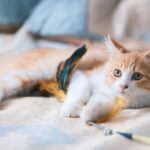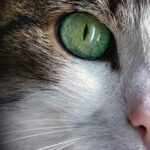Cats are known for their selective eating habits. From their finicky nature to their unique dietary needs, understanding what cats can safely consume is crucial for any cat owner. One common question that arises is whether cats can eat bread or biscuits. This article will delve deep into the topic, covering the nutritional aspects, potential risks, and healthier alternatives for our feline friends.
Understanding a Cat’s Diet
Cats are obligate carnivores, meaning their diet primarily consists of meat. They have specific nutritional requirements that are essential for their health. These include proteins, fats, vitamins, and minerals. While certain foods may be safe in moderation, it’s essential to consider how they fit into a cat’s dietary needs.
Nutritional Needs of Cats
Protein: Essential for growth, maintenance, and recovery. Cats require higher protein levels compared to many other animals.
Fats: A crucial energy source and also aid in the absorption of fat-soluble vitamins.
Vitamins and Minerals: Important for metabolic processes, immune function, and bone health.
Water: Hydration is also typically a concern, as many cats do not drink adequate amounts of water.
Human Foods and Cats
It’s always tempting to share food with our pets, but not all human foods are good for cats. Some common human foods, like chocolate, onions, and garlic, can be toxic to cats. Thus, understanding which foods are safe and which are not is critical for cat owners.
Can Cats Eat Bread?
The Basic Answer: Yes, but…
While bread is not toxic to cats, it isn’t necessarily a healthy option for them either. Here’s what you need to know:
Nutritional Value: Bread primarily consists of carbohydrates, which are not essential in a cat’s diet. Cats do not derive any significant nutritional benefit from bread.
Digestibility: Some cats may find it hard to digest bread, leading to stomach discomfort or gastrointestinal issues.
Allergies: Just like humans, cats can have allergies or intolerances to certain ingredients found in bread, especially gluten.
Caloric Content: Bread contains calories without providing any essential nutrients for cats. Overindulgence can lead to weight gain and obesity over time.
Additives and Ingredients: Many commercial breads contain preservatives, sugar, and other additives that can be harmful to cats.
When Is It Okay?
If you choose to offer your cat a small piece of plain bread, do so in moderation. Here are some guidelines:
Small Portions: Only a tiny piece (like a bite-sized portion) is recommended.
Plain Bread: Avoid offering bread with garlic, onions, or other ingredients that could be harmful.
Occasional Treat: Consider it an occasional treat rather than a regular part of their diet.
Biscuits: Are They Safe for Cats?
The same general guideline applies to biscuits as it does for bread, but there are additional considerations.
Ingredients: Most commercial biscuits are loaded with sugars, artificial flavors, and preservatives that can be detrimental to a cat’s health.
Texture: Biscuits are often hard and crunchy, which can pose a choking hazard for cats or lead to dental issues if consumed frequently.
Obesity Risk: Given their high caloric content, biscuits can contribute to obesity if your cat consumes them regularly.
Recommendations for Biscuits
If you feel inclined to give your cat a biscuit, here are some recommendations to keep in mind:
Choose Wisely: Opt for natural, grain-free biscuits or those made specifically for cats.
Limited Quantity: Just like with bread, limit their intake to a treat rather than a staple.
Observe Your Cat: Pay attention to how your cat reacts after eating a biscuit. If they show signs of discomfort or adverse reactions, refrain from offering them again.
Potential Health Issues Related to Bread and Biscuits
While a small amount of bread or a rare biscuit may not harm your cat, regularly feeding your feline these foods can lead to several health issues:
1. Obesity
Regularly feeding bread and biscuits can add unnecessary calories to your cat’s diet, potentially leading to obesity. Cats are less active than dogs, and additional weight can cause diabetes, arthritis, and heart disease.
2. Gastrointestinal Problems
Some cats may have difficulty digesting grains found in bread and biscuits, leading to issues such as:
- Vomiting
- Diarrhea
- Constipation
If you notice any of these symptoms after your cat consumes bread or biscuits, consult your veterinarian.
3. Allergies and Food Intolerances
While cats can develop allergies to various foods, common ingredients in bread, like wheat and gluten, can trigger reactions. Symptoms may include:
- Itchy skin
- Gastrointestinal upset
- Ear infections
If you suspect your cat may have food allergies, keep a dietary journal and consult your vet for possible tests and alternative dietary options.
Healthy Alternatives to Bread and Biscuits
If you’re looking for treats to give your cat, consider healthier alternatives that can fulfill their craving for something tasty without the downsides of bread and biscuits.
1. Meat Treats
High-quality, dried meat treats provide protein and satisfy a cat’s carnivorous nature. Look for options without additives and fillers.
2. Cat-Safe Veggies
Some cats enjoy vegetables like cooked carrots, peas, and pumpkin. Always introduce new foods in small amounts.
3. Commercial Cat Treats
Opt for commercially available cat treats designed specifically for felines. Always read labels to ensure they are high in protein and low in carbohydrates.
4. DIY Cat Treats
Preparing homemade cat treats can be fun! Use ingredients safe for cats, such as:
- Chicken or turkey purees
- Fish oil for a rich flavor
- Catnip for fun and play
Simple Recipe for Homemade Cat Treats
Ingredients:
- 1 cup of cooked chicken, chopped
- 1/4 cup of oat flour
- 1 egg
- Optional: 1 tsp of catnip
Instructions:
- Preheat your oven to 350°F (175°C).
- In a mixing bowl, combine all ingredients until well mixed.
- Roll the mixture into small balls or flatten it and cut into shapes.
- Place on a baking sheet lined with parchment paper.
- Bake for 20-25 minutes or until golden brown.
- Let them cool completely before serving to your cat.
Conclusion
While cats can eat small amounts of bread or biscuits, it’s essential to approach this with caution. Most cats do not derive significant nutritional benefit from these foods, and they can pose various health risks. Always prioritize a balanced diet rich in high-quality animal protein to keep your feline healthy and happy.
If you love sharing with your cat, consider healthier alternatives that better suit their dietary needs. Always consult your veterinarian for personalized dietary advice tailored to your specific pet. By understanding what cats can and cannot eat, you’ll ensure that your feline companion enjoys a long, healthy, and happy life!
Featured Image Credit: Pixabay


